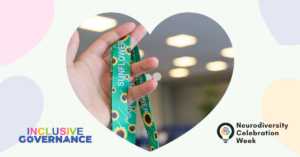
This blog post was written in partnership with Neurodiversity Celebration Week.
Are you passionate about supporting the education of children and young people with neurodivergence? Whether you have personal experience of – or a close connection to – neurodiversity, you can make an impact by volunteering as a school governor.
In this instalment of our Inclusive Governance blog series, we’re placing a spotlight on the key role school governors play in advocating for the needs of neurodivergent students, staff, and caregivers. We’ll explore the unique challenges these individuals encounter, shed light on their diverse experiences, and highlight how school governors can drive positive change in schools.
Neurodivergent vs. Neurotypical
To ensure every person thrives in the school environment, we must recognise every person thinks differently. The term ‘neurodivergent’ refers to individuals whose brains process information – and experience the world – differently. Some estimates suggest 15-20% of the population are neurodivergent, with well-known examples including autism, ADHD, and dyslexia. ‘Neurotypical’, on the other hand, refers to people who think ‘typically’ and whose brains are unaffected by these differences.
While neurodivergent people often have unique strengths and skill sets, they can also face obstacles at school. For example, surveys suggest students with ADHD are nearly twice as likely to be bullied than their neurotypical peers. Further, some neurodivergent people experience burnout due to ‘masking’ – suppressing their innate behaviours to conform to neurotypical standards. (However, not all neurodivergent people can or do mask – and young children may be less likely to do so).
With that in mind, let’s look at the important ways school governors can ensure the needs of neurodiverse people are met in schools.
Advocating for the right support and resources

While strategic, school governance is geared towards improving educational experiences and outcomes. Through tasks such as shaping a school’s long-term vision, encouraging responsible spending, and holding the leadership team to account, school governors can advocate for inclusive education.
Neurodivergent people often engage with learning, communication, and their environment in different ways. As a school governor, you could support them by:
- Advocating for comprehensive teacher training and ongoing CPD: firstly, use your oversight of funding to advocate for – and suggest – specialised training initiatives. Namely, to train teachers in accommodating neurodivergent students, colleagues and parents in their practice.
- Allocating resources for support: ask whether budgeting for specialised support for neurodivergent staff, students and volunteers is possible. Specifically, this could include making different support tools and assistive technology available to neurodivergent members of the school community, as well as subsidies for additional tuition or hiring specialised teachers. Consider whether funding from pupil premium could come into play here. Where interventions have been put in place, scrutinise the data accordingly to monitor their effectiveness.
- Creating sensory-friendly spaces: advocate for the creation of sensory spaces within schools where neurodivergent students can seek refuge when overwhelmed. Where possible, suggest sensory audits so that classrooms can be adapted accordingly, ensuring environments cater to diverse sensory needs. SEND audits, which take place annually, are a good opportunity to do this. To understand whether changes have been carried out effectively and impactfully, visit the school; and hear from pupils and their caregivers.
- Suggesting flexible learning policies: at board meetings, discuss the implementation of policies that allow for diverse teaching and learning methods. Consult with neurodivergent pupils, staff, volunteers and their caregivers, where possible, to ensure policies are inclusive. This ensures the curriculum and workplace is accessible to neurodivergent members of the school community in ways that suit their needs.
Community engagement and awareness raising
- Engaging with caregivers and students: use school visits as an opportunity to facilitate conversations with neurodivergent staff, pupils and caregivers. Any insights will enrich board meeting discussions and ensure representation of neurodivergent views. It is important to ensure school governors conduct conversations in a way that supports the communication needs of neurodivergent individuals.
- Raising awareness: Firstly, engage with Neurodiversity Celebration Week – an initiative that aims to challenge stereotypes and misconceptions around neurodivergence. Ensuring the school community understands what neurodiversity is and that every individual is unique in the way that they think, interact, and experience the world is vital. Secondly, suggest the use of the sunflower symbol. When worn on clothing, badges, or lanyards, the sunflower symbol indicates a person has a hidden disability or chronic condition. People with neurodivergent conditions may meet the definition of ‘disability’ and be defined as disabled for the purposes of the Equality Act 2010. In these instances, the sunflower can act as a reminder to respect different communication styles and needs.
- Diversify representation on governing boards: actively seek diverse perspectives, including neurodivergent individuals, to serve on governing boards. Reframe the conversation around neurodiversity at meetings, focussing on the many strengths of neurodivergent individuals. Differences should be embraced and unique talents should be celebrated. This should include understanding what adaptations neurodivergent school governors need to fully engage alongside their peers. Seek out up-to-date training for existing school governors and ensure a current link governor role covers this area of difference.
By taking these measures, school governors can significantly impact the educational experiences of neurodivergent people in the school community.
Our work with Neurodiversity Celebration Week
We’d like to thank Neurodiversity Celebration Week (NCW) for their input on this blog. This includes insights into advocating for neurodivergence in schools.
Helen Musgrove, Director of Physiological Consulting at Lexxic (the official partners of NCW), said:
School governors can play a huge role in empowering neurodiversity, and it is important that they understand the benefits to students/children in having informed educators that are empathetic and understanding around the benefits and value of neurodiversity in the world. School governors can be important role models, changing the narrative around neurodiversity, inspiring neurodivergent students and ensuring they have the tools and confidence to succeed. This will help to empower neurodiversity across the world and in futures to come.
Feeling inspired?
If you’re ready to make a difference to a school in your local area, find out more about applying to become a school governor today!